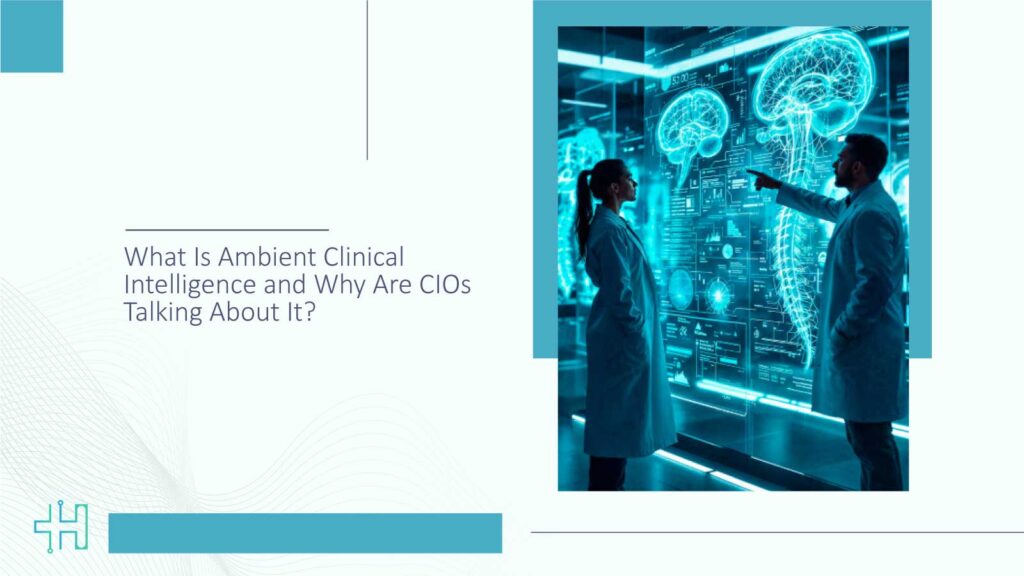Ambient Clinical Intelligence (ACI) is a technological breakthrough in healthcare that meets the increasing demand for documentation burden-cutting devices. It simply uses artificial intelligence to effortlessly record the clinical interactions and change them into a more organized form of data, which is directly linked to electronic health records (EHRs).
The much-anticipated benefits of this product, such as the increased accuracy and efficiency, as well as better patient outcomes, make the question its way to hospital CIOs and healthcare executives all over the globe.
What is Ambient Clinical Intelligence?
Ambient Clinical Intelligence is a healthcare AI-based documentation simplifying technology. In ACI, the same conversations between practitioners and patients are captured in real time, which differently traditional documentation methods require manual entries in EHR by clinicians.
Some of the features of ACI may include:
- Automatic speech recognition: It takes spoken words and changes them into computer-readable language.
- Natural language processing (NLP): Interprets the clinical meaning behind conversations.
- Machine Learning: It improves the process of transcription and medical note creation over time based on data patterns and user feedback…
When done professionally, it is virtually impossible to tell from the final documentation who has done what part of the work and when. This, in turn, makes the healthcare professionals put the patient first and work harmoniously without compromising either accuracy or completeness of the presented documentation.
Why CIOs are so inclined towards Ambient Clinical Intelligence?
CIOs are active supporters of ACI mainly because such devices perform tasks that heavily influence their job strategically and operationally:
1. Reducing Clinician Burnout
A review presented by clinicians showed that nearly half of their entire work time is dedicated to less patient care and more documentation of cases managed. Repetitive administrative duties have been pointed out to be the source of many burnout symptoms, which in turn causes dissatisfaction and problems in employee turnover rates, next to a routinized work environment. A study led by Mass General Brigham found that the use of ambient documentation technologies led to a 21.2% absolute reduction in burnout prevalence among clinicians over 84 days, highlighting the tangible impact of ACI. ACI is a suitable helper in making the documentation free, and as such, letting clinicians occupy more time with their patients is rather a dream come true than not.
2. Enhancing Documentation Accuracy
Handwritten documentation suffers from frequent errors and discrepancies. At worst, the consequences of improper care documentation may be corresponding to poor patient health, violations of healthcare industry regulations, and even issuing wrong bills for the patients. ACI enables the normalization of clinical data records, which in turn results in error reduction as well as the increased dependability of health records.
3. Turning the Clinical Interaction into a Positive Experience
In situations when AI takes up the task of documentation, doctors can look the patients directly in the eyes, actively listen, and be more friendly and supportive. Consequently, such changes build a foundation of trust and thus encourage the patients to share with the doctor important health information that will contribute to better healthcare in the end.
4. Increasing the Operational Efficiency
The healthcare sector has to deal with the issue of how to enhance the current workflow and, at the same time, reduce the operational costs. With ACI, the performance of documentation takes less time, and thus patient rotation can be done more speedily, and staff are free to devote themselves to activities of greater value to organizations.
5. Provision of Support in the Data-Driven Decision-Making
It is possible to use the data that Ambient Clinical Intelligence has processed to make statistics, to monitor the health of the population, as well as to assist the strategic planning. CIOs understand that decision-making is most effective when based on access to reliable and up-to-the-minute data from all parts of the organization.
Key Benefits of Ambient Clinical Intelligence
1. Time Savings
By automatically generating clinical notes during consultations, ACI can save clinicians several hours per week, reducing administrative fatigue and improving productivity.
2. Compliance and Audit Readiness
Structured and accurate documentation ensures compliance with healthcare regulations and makes auditing processes smoother. ACI reduces the risk of penalties due to incomplete or incorrect records.
3. Scalability
AI-based documentation solutions can easily scale across departments and facilities without requiring proportional increases in staffing, making it an attractive solution for growing healthcare systems.
4. Enhanced Patient Satisfaction
Patients are more likely to feel heard and understood when clinicians are fully engaged during consultations. By removing the distraction of manual note-taking, ACI helps build stronger patient relationships.
5. Integration With Other Health Technologies
Modern ACI platforms integrate seamlessly with EHRs, telehealth systems, and analytics tools. This interoperability ensures that the data captured is useful not only for documentation but also for broader health technology ecosystems.
Challenges and Considerations for CIOs
While Ambient Clinical Intelligence offers many advantages, CIOs must carefully consider certain challenges before implementation:
1. Data Privacy and Security
Healthcare data is highly sensitive, and maintaining compliance with regulations like HIPAA is critical. Implementing ACI requires robust cybersecurity measures to protect patient information.
2. System Integration
Successful deployment depends on the seamless integration of ACI platforms with existing EHRs and health IT systems. Poor integration can lead to workflow disruption and underutilization of the technology.
3. Clinician Training and Adoption
Even the most sophisticated ACI system will fail if clinicians are not trained properly. Organizations need structured onboarding programs to ensure staff feel comfortable and confident using the technology.
4. Cost Considerations
Although ACI can provide long-term cost savings through efficiency gains, the initial investment in technology, infrastructure, and training can be significant. CIOs need to weigh ROI against upfront expenditures.
The Future of Ambient Clinical Intelligence
Ambient Clinical Intelligence is eventually set to take the center stage as the face of the digital healthcare transformation. Some of the up-and-coming future trends in this area include:
Advanced AI Capabilities: The uninterrupted development in NLP and ASR will facilitate the creation of more intelligent clinical documentation that will be more accurate and able to adjust to different clinical contexts.
Voice-First Interfaces: The use of voice commands to interact with health IT systems may become a routine for clinicians, thus the need for manual input will be reduced even further.
Predictive Analytics Integration: Embedding ACI data into predictive models can be the key to unlocking patient risk identification, treatment plan optimization, and care that is proactive.
Wider Adoption Across Specialties: ACI is capable of changing from healthcare workflows for less than a minute of primary care to complex ones like oncology and cardiology; thus, it can be used in any specialty, and the possibilities of its benefits are virtually endless in the healthcare systems.
CIOs are particularly interested in these developments as they envision these trends as elements of a larger whole picture that represents the organizational targets: decreasing the expenses of operations, enhancing the quality of care, and promoting the data-driven decision-making process.
FAQs
1. What is Ambient Clinical Intelligence (ACI)?
Ambient Clinical Intelligence is an advanced technology that uses artificial intelligence to effortlessly document clinical interactions between doctors and patients, and at the same time, organizes the data into structured clinical notes. In addition, it minimizes manual documentation, enhances the precision of the data, and communicates electronically with EHRs.
2. How does ACI benefit clinicians?
The technology of ACI works in a manner that staff will no longer be overworked administratively; besides this, it also incites doctors to abuse their time with patients. An efficient way of documentation is set as one of the several ways ACI supports compliance and enriches the relations between the patients and the clinicians.
3. Why are CIOs interested in Ambient Clinical Intelligence?
The areas that CIOs concentrate on regarding ACI are where it is successful in creating seamless processes, where it helps to prevent staff burnout, where it is a guarantee of accuracy of the documentation, and where the provision of good-quality data for further analysis and decision-making is possible.
4. Is Ambient Clinical Intelligence safe for patient data?
Definitely, if ACI solutions are implemented properly, they comply strictly with all the related healthcare regulations, such as HIPAA. Businesses must also put in place top-notch cybersecurity measures to keep patient information secure from hackers.
5. Can ACI integrate with existing EHR systems?
Generally, the ACI platforms that are up-to-date are built with a design that allows for easy integration with EHRs and other healthcare IT systems in order to have a smooth data transfer and minimum workflow interruption.
Keep reading on Health Technology Insights.
To participate in our interviews, please write to our HealthTech Media Room at sudipto@intentamplify.com



